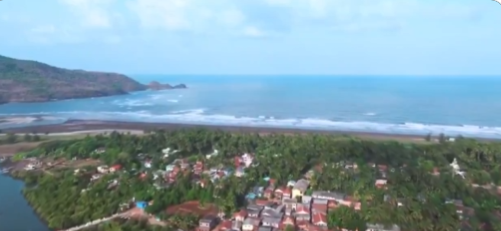Five Maharashtra Beaches Receive Prestigious International Blue Flag Certification

Five Maharashtra Beaches Receive Prestigious International Blue Flag Certification
Introduction
In a major boost to India’s coastal sustainability and tourism credentials, five beaches in Maharashtra have been awarded the coveted Blue Flag certification, an internationally recognised eco-label signifying high environmental and quality standards. The announcement was made by Maharashtra Women and Child Development Minister Aditi Tatkare.The newly certified beaches are:
- Shrivardhan and Nagaon beaches in Raigad district,
- Parnaka Beach in Palghar district, and
- Guhagar and Ladghar beaches in Ratnagiri district.
This achievement underscores Maharashtra’s commitment to sustainable coastal management, clean tourism, and environmental conservation, aligning with India’s national vision for “Blue Economy” and the Clean Beaches – Blue Flag Beaches initiative led by the Ministry of Environment, Forest and Climate Change (MoEFCC).
I. About the Blue Flag Certification
The Blue Flag is a globally recognised certification awarded by the Foundation for Environmental Education (FEE), headquartered in Denmark. It is conferred on beaches, marinas, and sustainable boating tourism operators that meet 33 stringent criteria under four broad categories:
- Environmental Education and Information
- Water Quality
- Environmental Management
- Safety and Services
The certification ensures that beaches maintain world-class standards of cleanliness, safety, accessibility, and environmental responsibility.
II. Significance of Maharashtra’s Achievement
- Environmental Leadership:
Maharashtra becomes one of the few Indian states to have multiple beaches recognised under the Blue Flag programme, highlighting its growing focus on eco-tourism and sustainable coastal ecosystems. - Boost to Eco-Tourism:
The certification is expected to attract domestic and international tourists seeking clean, safe, and environmentally managed destinations. - Sustainable Development Alignment:
The recognition aligns with India’s broader Sustainable Development Goals (SDG 14 – Life Below Water) and supports the national Blue Economy Policy Framework, which emphasises environmentally responsible use of marine and coastal resources. - Community and Administrative Coordination:
The achievement results from coordinated efforts between local self-governments, the Maharashtra Maritime Board, and the Ministry of Environment, Forest and Climate Change (MoEFCC).
III. About the Blue Flag Programme in India
India’s Blue Flag initiative is implemented under the Integrated Coastal Zone Management Programme (ICZMP) and the BEAMS (Beach Environment and Aesthetic Management Services) scheme launched by MoEFCC.
- India currently has over 20 Blue Flag-certified beaches, with Maharashtra joining states like Gujarat, Odisha, Tamil Nadu, and Andhra Pradesh.
- The first Blue Flag beach in India was Chandrabhaga Beach in Odisha, recognised in 2018.
The Environmental Education Division of FEE, in collaboration with the Society of Integrated Coastal Management (SICOM) under MoEFCC, monitors and maintains the certification process.
IV. Broader Environmental and Economic Impact
- Marine Conservation:
The recognition promotes better waste management, biodiversity protection, and sustainable tourism along Maharashtra’s 720 km coastline. - Employment and Livelihoods:
Eco-tourism initiatives linked to Blue Flag certification generate employment for local communities in hospitality, waste management, and tourism infrastructure. - Public Awareness:
Blue Flag beaches serve as models of environmental education, encouraging communities and visitors to adopt sustainable practices.
V. Analytical Perspective
The certification of Maharashtra’s five beaches signifies India’s continued progress toward global environmental benchmarks. As coastal tourism grows, ensuring ecological balance is crucial to prevent overdevelopment and pollution.From a policy standpoint, this achievement illustrates successful implementation of coastal governance models, where decentralised management, community participation, and international collaboration converge effectively.Moreover, such recognitions help India bolster its credentials in international environmental diplomacy, particularly under platforms like the United Nations Environment Programme (UNEP) and the Convention on Biological Diversity (CBD).
Conclusion
The conferment of Blue Flag certification to five Maharashtra beaches marks a significant milestone in India’s journey towards sustainable coastal development. It reflects not only improved environmental governance but also growing public consciousness about the need to preserve marine ecosystems.As India aspires to expand its network of Blue Flag beaches, initiatives like BEAMS and ICZMP will continue to play a pivotal role in achieving a balance between tourism, economy, and ecology.
Updated - October 12, 2025 8:08 PM | News On Air